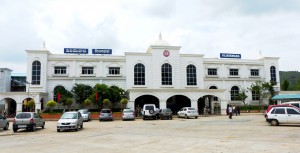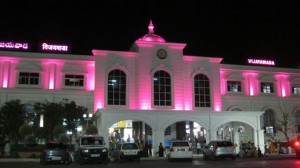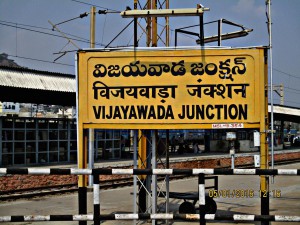 Vijayawada railway station is an Indian railway station in Vijayawada of Andhra Pradesh. It is the second busiest railway junction of Indian Railways, next to Mumbai Central and is situated on the mutual lines of Howrah-Chennai and New Delhi–Chennai main lines.The station is the divisional headquarters of Vijayawada railway division in South Central Railway zone.
Vijayawada railway station is an Indian railway station in Vijayawada of Andhra Pradesh. It is the second busiest railway junction of Indian Railways, next to Mumbai Central and is situated on the mutual lines of Howrah-Chennai and New Delhi–Chennai main lines.The station is the divisional headquarters of Vijayawada railway division in South Central Railway zone.
Vijayawada railway station is categorized as an A-1 station and also one of the ten model stations in the Vijayawada division. It is also one of the busiest railway stations in India with over 400 trains of freight and passenger pass through it and serving about 1.40 lakh passengers everyday.
The Vijayawada railway station was constructed in 1888 when the Southern Maharatta Railway’s main eastward route was connected with other lines going through Vijayawada. In 1889, the Nizam’s Guaranteed State Railway constructed a line between Secunderabad Railway Station and Vijayawada as an extension railway for Bezawada; the station subsequently became a junction of three lines from different directions.
On 1 November 1899, the broad gauge line was constructed between Vijayawada and Chennai, making rail journey between Chennai, Mumbai, Howrah, New Delhi and Hyderabad possible. In the following decades the Vijayawada railway station was developed into a junction until the nationalisation of all the independent railways in India occurred; following nationalisation, Indian Railways was formed under the Ministry of Railways in 1950 by the Government of India. The Vijayawada railway station, as the headquarters of Vijayawada Division, was assigned to the Southern Railway. In 1966, a new zone, South Central Railway, was formed, with Secunderabad as its headquarters; Vijayawada Division and Vijayawada Junction were merged with the new railway.
In 1969, the Golconda Express was introduced between Vijayawada and Secunderabad as the fastest steam-hauled train in the country, with an average speed of 58 km/h. As of 2012, the Vijayawada railway station is one of the busiest railway stations in India
 An average of 1.40 lakh passengers are served per day and 50 million annually. More than 250 passenger trains and 150 goods trains utilize the station daily, with each train stopping for at least 15 to 20 minutes.
An average of 1.40 lakh passengers are served per day and 50 million annually. More than 250 passenger trains and 150 goods trains utilize the station daily, with each train stopping for at least 15 to 20 minutes.
The Vijayawada Junction also houses a Diesel Loco Shed which has the WDM-2 Locomotive and also an Electric Loco Shed which has the WAG-7, WAM-4, WAG-5 locos.Since the headquarters of South-East railway moved to Bhubaneswar from Visakhapatnam, Vijayawada Railway station has seen major development and new appearance in the last five years. In the FY 2009, the Indian Railways Company board allocated ₹3.5 crore (US$520,000) for improvements to the transport hub. A central aspect of the improvements was an “Integrated Security Scheme” which included construction of a compound wall around the station premises and a reduction in the number of entrances as a precaution against terrorism.
Notification For Vijayawada
 Some Trains originate and Passes through Vijayawada Junction:
Some Trains originate and Passes through Vijayawada Junction:
12784:Secunderabad Visakhapatnam AC Express
18401:Puri- – Okha-express
18501:Visakhapatnam Gandhidham BG Express
12967:Jaipur Express
12669:Ganga Kaveri Express
12969:Coimbatore Jaipur Express
12622:Tamil Nadu Express
12737:Goutami Express
12764:Padmavati Express
17015: Visakha Express
